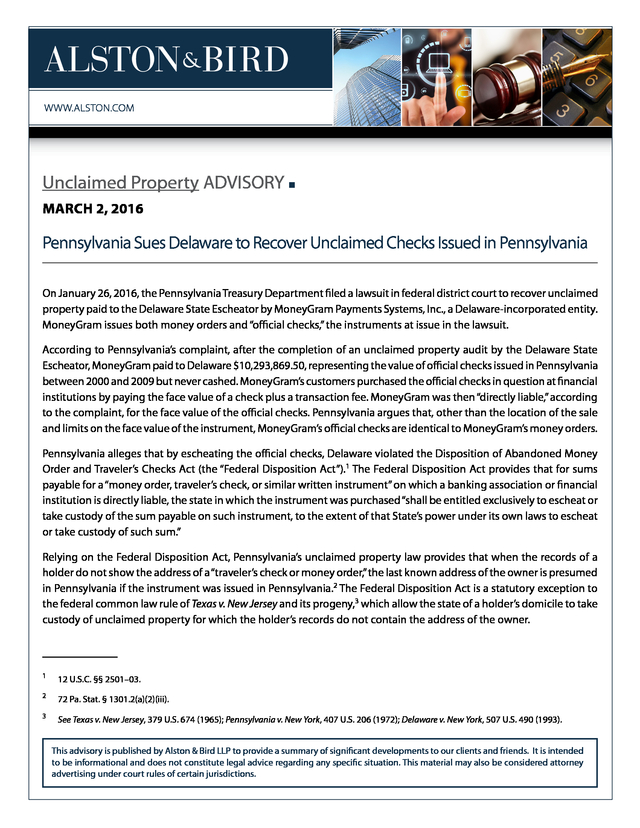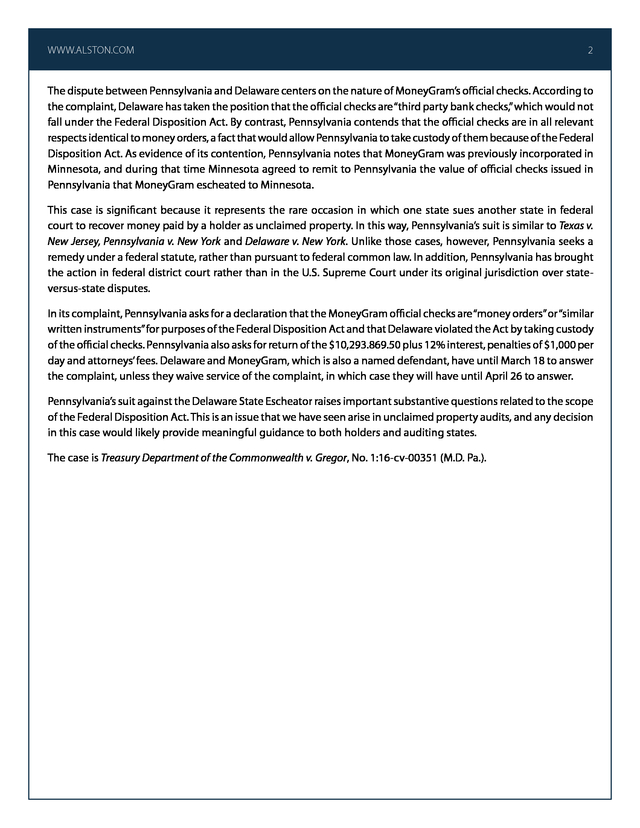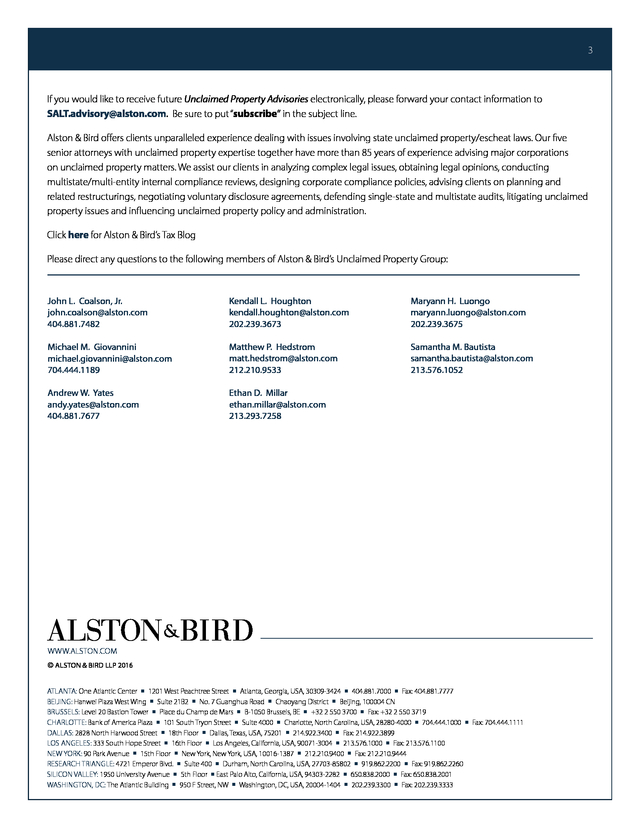Unclaimed Property Advisory: Pennsylvania Sues Delaware to Recover Unclaimed Checks Issued in Pennsylvania – March 2, 2016
Alston & Bird
Description
WWW.ALSTON.COM
Unclaimed Property ADVISORY n
MARCH 2, 2016
Pennsylvania Sues Delaware to Recover Unclaimed Checks Issued in Pennsylvania
On January 26, 2016, the Pennsylvania Treasury Department filed a lawsuit in federal district court to recover unclaimed
property paid to the Delaware State Escheator by MoneyGram Payments Systems, Inc., a Delaware-incorporated entity.
MoneyGram issues both money orders and “official checks,” the instruments at issue in the lawsuit.
According to Pennsylvania’s complaint, after the completion of an unclaimed property audit by the Delaware State
Escheator, MoneyGram paid to Delaware $10,293,869.50, representing the value of official checks issued in Pennsylvania
between 2000 and 2009 but never cashed. MoneyGram’s customers purchased the official checks in question at financial
institutions by paying the face value of a check plus a transaction fee. MoneyGram was then “directly liable,” according
to the complaint, for the face value of the official checks. Pennsylvania argues that, other than the location of the sale
and limits on the face value of the instrument, MoneyGram’s official checks are identical to MoneyGram’s money orders.
Pennsylvania alleges that by escheating the official checks, Delaware violated the Disposition of Abandoned Money
Order and Traveler’s Checks Act (the “Federal Disposition Act”).1 The Federal Disposition Act provides that for sums
payable for a “money order, traveler’s check, or similar written instrument” on which a banking association or financial
institution is directly liable, the state in which the instrument was purchased “shall be entitled exclusively to escheat or
take custody of the sum payable on such instrument, to the extent of that State’s power under its own laws to escheat
or take custody of such sum.”
Relying on the Federal Disposition Act, Pennsylvania’s unclaimed property law provides that when the records of a
holder do not show the address of a “traveler’s check or money order,” the last known address of the owner is presumed
in Pennsylvania if the instrument was issued in Pennsylvania.2 The Federal Disposition Act is a statutory exception to
the federal common law rule of Texas v.
New Jersey and its progeny,3 which allow the state of a holder’s domicile to take custody of unclaimed property for which the holder’s records do not contain the address of the owner. 1 12 U.S.C. §§ 2501–03. 2 72 Pa. Stat.
§ 1301.2(a)(2)(iii). 3 See Texas v. New Jersey, 379 U.S. 674 (1965); Pennsylvania v.
New York, 407 U.S. 206 (1972); Delaware v. New York, 507 U.S.
490 (1993). This advisory is published by Alston & Bird LLP to provide a summary of significant developments to our clients and friends. It is intended to be informational and does not constitute legal advice regarding any specific situation. This material may also be considered attorney advertising under court rules of certain jurisdictions. .
WWW.ALSTON.COM 2 The dispute between Pennsylvania and Delaware centers on the nature of MoneyGram’s official checks. According to the complaint, Delaware has taken the position that the official checks are “third party bank checks,” which would not fall under the Federal Disposition Act. By contrast, Pennsylvania contends that the official checks are in all relevant respects identical to money orders, a fact that would allow Pennsylvania to take custody of them because of the Federal Disposition Act. As evidence of its contention, Pennsylvania notes that MoneyGram was previously incorporated in Minnesota, and during that time Minnesota agreed to remit to Pennsylvania the value of official checks issued in Pennsylvania that MoneyGram escheated to Minnesota. This case is significant because it represents the rare occasion in which one state sues another state in federal court to recover money paid by a holder as unclaimed property.
In this way, Pennsylvania’s suit is similar to Texas v. New Jersey, Pennsylvania v. New York and Delaware v. New York.
Unlike those cases, however, Pennsylvania seeks a remedy under a federal statute, rather than pursuant to federal common law. In addition, Pennsylvania has brought the action in federal district court rather than in the U.S. Supreme Court under its original jurisdiction over stateversus-state disputes. In its complaint, Pennsylvania asks for a declaration that the MoneyGram official checks are “money orders” or “similar written instruments” for purposes of the Federal Disposition Act and that Delaware violated the Act by taking custody of the official checks.
Pennsylvania also asks for return of the $10,293.869.50 plus 12% interest, penalties of $1,000 per day and attorneys’ fees. Delaware and MoneyGram, which is also a named defendant, have until March 18 to answer the complaint, unless they waive service of the complaint, in which case they will have until April 26 to answer. Pennsylvania’s suit against the Delaware State Escheator raises important substantive questions related to the scope of the Federal Disposition Act. This is an issue that we have seen arise in unclaimed property audits, and any decision in this case would likely provide meaningful guidance to both holders and auditing states. The case is Treasury Department of the Commonwealth v.
Gregor, No. 1:16-cv-00351 (M.D. Pa.). .
3 If you would like to receive future Unclaimed Property Advisories electronically, please forward your contact information to SALT.advisory@alston.com. Be sure to put “subscribe” in the subject line. Alston & Bird offers clients unparalleled experience dealing with issues involving state unclaimed property/escheat laws. Our five senior attorneys with unclaimed property expertise together have more than 85 years of experience advising major corporations on unclaimed property matters. We assist our clients in analyzing complex legal issues, obtaining legal opinions, conducting multistate/multi-entity internal compliance reviews, designing corporate compliance policies, advising clients on planning and related restructurings, negotiating voluntary disclosure agreements, defending single-state and multistate audits, litigating unclaimed property issues and influencing unclaimed property policy and administration. Click here for Alston & Bird’s Tax Blog Please direct any questions to the following members of Alston & Bird’s Unclaimed Property Group: John L.
Coalson, Jr. john.coalson@alston.com 404.881.7482 Kendall L. Houghton kendall.houghton@alston.com 202.239.3673 Maryann H. Luongo maryann.luongo@alston.com 202.239.3675 Michael M.
Giovannini michael.giovannini@alston.com 704.444.1189 Matthew P. Hedstrom matt.hedstrom@alston.com 212.210.9533 Samantha M. Bautista samantha.bautista@alston.com 213.576.1052 Andrew W.
Yates andy.yates@alston.com 404.881.7677 Ethan D. Millar ethan.millar@alston.com 213.293.7258 WWW.ALSTON.COM © ALSTON & BIRD LLP 2016 ATLANTA: One Atlantic Center n 1201 West Peachtree Street n Atlanta, Georgia, USA, 30309-3424 n 404.881.7000 n Fax: 404.881.7777 BEIJING: Hanwei Plaza West Wing n Suite 21B2 n No. 7 Guanghua Road n Chaoyang District n Beijing, 100004 CN BRUSSELS: Level 20 Bastion Tower n Place du Champ de Mars n B-1050 Brussels, BE n +32 2 550 3700 n Fax: +32 2 550 3719 CHARLOTTE: Bank of America Plaza n 101 South Tryon Street n Suite 4000 n Charlotte, North Carolina, USA, 28280-4000 n 704.444.1000 n Fax: 704.444.1111 DALLAS: 2828 North Harwood Street n 18th Floor n Dallas, Texas, USA, 75201 n 214.922.3400 n Fax: 214.922.3899 LOS ANGELES: 333 South Hope Street n 16th Floor n Los Angeles, California, USA, 90071-3004 n 213.576.1000 n Fax: 213.576.1100 NEW YORK: 90 Park Avenue n 15th Floor n New York, New York, USA, 10016-1387 n 212.210.9400 n Fax: 212.210.9444 RESEARCH TRIANGLE: 4721 Emperor Blvd. n Suite 400 n Durham, North Carolina, USA, 27703-85802 n 919.862.2200 n Fax: 919.862.2260 SILICON VALLEY: 1950 University Avenue n 5th Floor n East Palo Alto, California, USA, 94303-2282 n 650.838.2000 n Fax: 650.838.2001 WASHINGTON, DC: The Atlantic Building n 950 F Street, NW n Washington, DC, USA, 20004-1404 n 202.239.3300 n Fax: 202.239.3333 .
New Jersey and its progeny,3 which allow the state of a holder’s domicile to take custody of unclaimed property for which the holder’s records do not contain the address of the owner. 1 12 U.S.C. §§ 2501–03. 2 72 Pa. Stat.
§ 1301.2(a)(2)(iii). 3 See Texas v. New Jersey, 379 U.S. 674 (1965); Pennsylvania v.
New York, 407 U.S. 206 (1972); Delaware v. New York, 507 U.S.
490 (1993). This advisory is published by Alston & Bird LLP to provide a summary of significant developments to our clients and friends. It is intended to be informational and does not constitute legal advice regarding any specific situation. This material may also be considered attorney advertising under court rules of certain jurisdictions. .
WWW.ALSTON.COM 2 The dispute between Pennsylvania and Delaware centers on the nature of MoneyGram’s official checks. According to the complaint, Delaware has taken the position that the official checks are “third party bank checks,” which would not fall under the Federal Disposition Act. By contrast, Pennsylvania contends that the official checks are in all relevant respects identical to money orders, a fact that would allow Pennsylvania to take custody of them because of the Federal Disposition Act. As evidence of its contention, Pennsylvania notes that MoneyGram was previously incorporated in Minnesota, and during that time Minnesota agreed to remit to Pennsylvania the value of official checks issued in Pennsylvania that MoneyGram escheated to Minnesota. This case is significant because it represents the rare occasion in which one state sues another state in federal court to recover money paid by a holder as unclaimed property.
In this way, Pennsylvania’s suit is similar to Texas v. New Jersey, Pennsylvania v. New York and Delaware v. New York.
Unlike those cases, however, Pennsylvania seeks a remedy under a federal statute, rather than pursuant to federal common law. In addition, Pennsylvania has brought the action in federal district court rather than in the U.S. Supreme Court under its original jurisdiction over stateversus-state disputes. In its complaint, Pennsylvania asks for a declaration that the MoneyGram official checks are “money orders” or “similar written instruments” for purposes of the Federal Disposition Act and that Delaware violated the Act by taking custody of the official checks.
Pennsylvania also asks for return of the $10,293.869.50 plus 12% interest, penalties of $1,000 per day and attorneys’ fees. Delaware and MoneyGram, which is also a named defendant, have until March 18 to answer the complaint, unless they waive service of the complaint, in which case they will have until April 26 to answer. Pennsylvania’s suit against the Delaware State Escheator raises important substantive questions related to the scope of the Federal Disposition Act. This is an issue that we have seen arise in unclaimed property audits, and any decision in this case would likely provide meaningful guidance to both holders and auditing states. The case is Treasury Department of the Commonwealth v.
Gregor, No. 1:16-cv-00351 (M.D. Pa.). .
3 If you would like to receive future Unclaimed Property Advisories electronically, please forward your contact information to SALT.advisory@alston.com. Be sure to put “subscribe” in the subject line. Alston & Bird offers clients unparalleled experience dealing with issues involving state unclaimed property/escheat laws. Our five senior attorneys with unclaimed property expertise together have more than 85 years of experience advising major corporations on unclaimed property matters. We assist our clients in analyzing complex legal issues, obtaining legal opinions, conducting multistate/multi-entity internal compliance reviews, designing corporate compliance policies, advising clients on planning and related restructurings, negotiating voluntary disclosure agreements, defending single-state and multistate audits, litigating unclaimed property issues and influencing unclaimed property policy and administration. Click here for Alston & Bird’s Tax Blog Please direct any questions to the following members of Alston & Bird’s Unclaimed Property Group: John L.
Coalson, Jr. john.coalson@alston.com 404.881.7482 Kendall L. Houghton kendall.houghton@alston.com 202.239.3673 Maryann H. Luongo maryann.luongo@alston.com 202.239.3675 Michael M.
Giovannini michael.giovannini@alston.com 704.444.1189 Matthew P. Hedstrom matt.hedstrom@alston.com 212.210.9533 Samantha M. Bautista samantha.bautista@alston.com 213.576.1052 Andrew W.
Yates andy.yates@alston.com 404.881.7677 Ethan D. Millar ethan.millar@alston.com 213.293.7258 WWW.ALSTON.COM © ALSTON & BIRD LLP 2016 ATLANTA: One Atlantic Center n 1201 West Peachtree Street n Atlanta, Georgia, USA, 30309-3424 n 404.881.7000 n Fax: 404.881.7777 BEIJING: Hanwei Plaza West Wing n Suite 21B2 n No. 7 Guanghua Road n Chaoyang District n Beijing, 100004 CN BRUSSELS: Level 20 Bastion Tower n Place du Champ de Mars n B-1050 Brussels, BE n +32 2 550 3700 n Fax: +32 2 550 3719 CHARLOTTE: Bank of America Plaza n 101 South Tryon Street n Suite 4000 n Charlotte, North Carolina, USA, 28280-4000 n 704.444.1000 n Fax: 704.444.1111 DALLAS: 2828 North Harwood Street n 18th Floor n Dallas, Texas, USA, 75201 n 214.922.3400 n Fax: 214.922.3899 LOS ANGELES: 333 South Hope Street n 16th Floor n Los Angeles, California, USA, 90071-3004 n 213.576.1000 n Fax: 213.576.1100 NEW YORK: 90 Park Avenue n 15th Floor n New York, New York, USA, 10016-1387 n 212.210.9400 n Fax: 212.210.9444 RESEARCH TRIANGLE: 4721 Emperor Blvd. n Suite 400 n Durham, North Carolina, USA, 27703-85802 n 919.862.2200 n Fax: 919.862.2260 SILICON VALLEY: 1950 University Avenue n 5th Floor n East Palo Alto, California, USA, 94303-2282 n 650.838.2000 n Fax: 650.838.2001 WASHINGTON, DC: The Atlantic Building n 950 F Street, NW n Washington, DC, USA, 20004-1404 n 202.239.3300 n Fax: 202.239.3333 .















